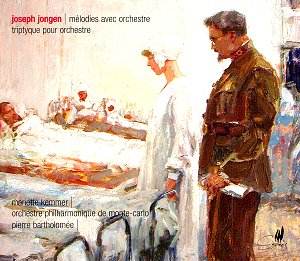Though he wrote a good deal of vocal music, including
several large-scale choral pieces such as the majestic Mass
Op.130 (1945 Ė soloists, chorus, organ and brass), his prize-winning
cantata Comala Op.14 (1897 Ė soloists, chorus and
orchestra, which will soon be available on disc) as well as several
choral works with or without accompaniment, Jongen only composed
thirty songs (eight of them are unpublished and possibly withdrawn
by the composer) of which the present release offers a generous,
if incomplete selection. (Deux mélodies Op.29 of
1906, Les pauvres Op.64 of 1919 on a poem by Verhaeren
and Bal des fleurs Op.25 No.4 have not been included.)
Most of his songs, originally for voice and piano, have been orchestrated
by the composer, who also made most of them available in a chamber
version (voice, piano and string quartet). However, though not particularly
abundant, Jongenís songs are far from negligible and are particularly
attractive in their orchestral guise.
The earlier songs here, Deux mélodies
Op.25 of 1902 and Deux mélodies Op.45
of 1914, are still redolent of, say, Fauré or Duparc, and
none the worse for that. The original Op.25 cycle consists of
four songs. Three of them were orchestrated in 1922 and two are
heard here (Après un rêve on a poem by Romain
Bussine and Chanson roumaine on a text by Hélène
Vacaresco). Though still fairly traditional, these songs are as
beautifully written as anything else in his output. Deux
mélodies Op.45 (1914, orchestrated 1922) set a
fine symbolic poem by Franz Hellens (Les cadrans) and a
poem by Jules Delacre (Que dans les cieux). They are quite
similar to the earlier songs, although the much finer literary
quality of the texts (especially that by Hellens conjuring-up
some mysterious visions) drew a superb musical response on Jongenís
part.
However, Cinq mélodies Op.57,
completed in 1917-1918, is one of Jongenís crowning achievements
and a real masterpiece. Originally, Jongen planned to set Hellensí
war poems Les fêtes rouges, but eventually did not
set the fourth poem. Hellensí poems, for all their Christian symbolism,
express a dark, sometimes ironic vision of warís atrocities and
are conspicuously free of any jingoism. Rather, the harsh realities
of war depicted in LíEpiphanie des exilés (symbolised
as the three Magi), still more forcefully in Le carnaval des
tranchées in which the soldierís bride (i.e. Death)
is described as "pure and gloriously beautiful" and
finally in Langues de feu (in which the apostles are called
upon to go and preach Ďjust hatredí), are echoed by some powerfully
impressive, at times grotesque, always gripping music. The cycle
is completed by two songs of a more tender, gentle character offsetting
the tension of the preceding songs and thus providing this impressive
cycle with an appeased, though by no means serene conclusion.
Triptyque pour orchestre Op.103
is a much later piece completed in 1937. To some extent, this
substantial work pays a direct and sincere homage to Debussy and
Ravel, whom Jongen admired and who were among his models. At times,
the homage goes as far as alluding to the French composersí music
or even briefly quoting from it. Jongen, however, remains his
own self, and the music is vintage Jongen throughout. The opening
movement moves along quietly, dreamily, almost seamlessly so.
The central Scherzo is Jongen in his outdoor mood, skipping along
with infectious energy and briefly alluding to Debussyís Fêtes.
The final movement reverts to the contemplative mood of the opening
one. It opens mysteriously, redolent of the dawn section from
Ravelís Daphnis et Chloé, but the music then
goes on in Jongenís own (musical) terms. This much neglected work
is one of Jongenís finest, most colourful and superbly crafted
pieces in which he effortlessly displays his remarkable orchestral
mastery. I had never heard this piece before, but I am now convinced
that it is a major, unjustly neglected work.
Excellent performances and recordings that serve
the music well. Mariette Kemmer sings beautifully throughout and
gets a superb support from the Orchestre Philharmonique de Monte-Carlo
that plays this much unfamiliar music most lovingly and convincingly.
CYPRES have already put us much in their debt for several outstanding
discs of Jongenís music. There is much to enjoy in this most welcome
release that I warmly recommend. My record of the month anyway.
Hubert Culot
